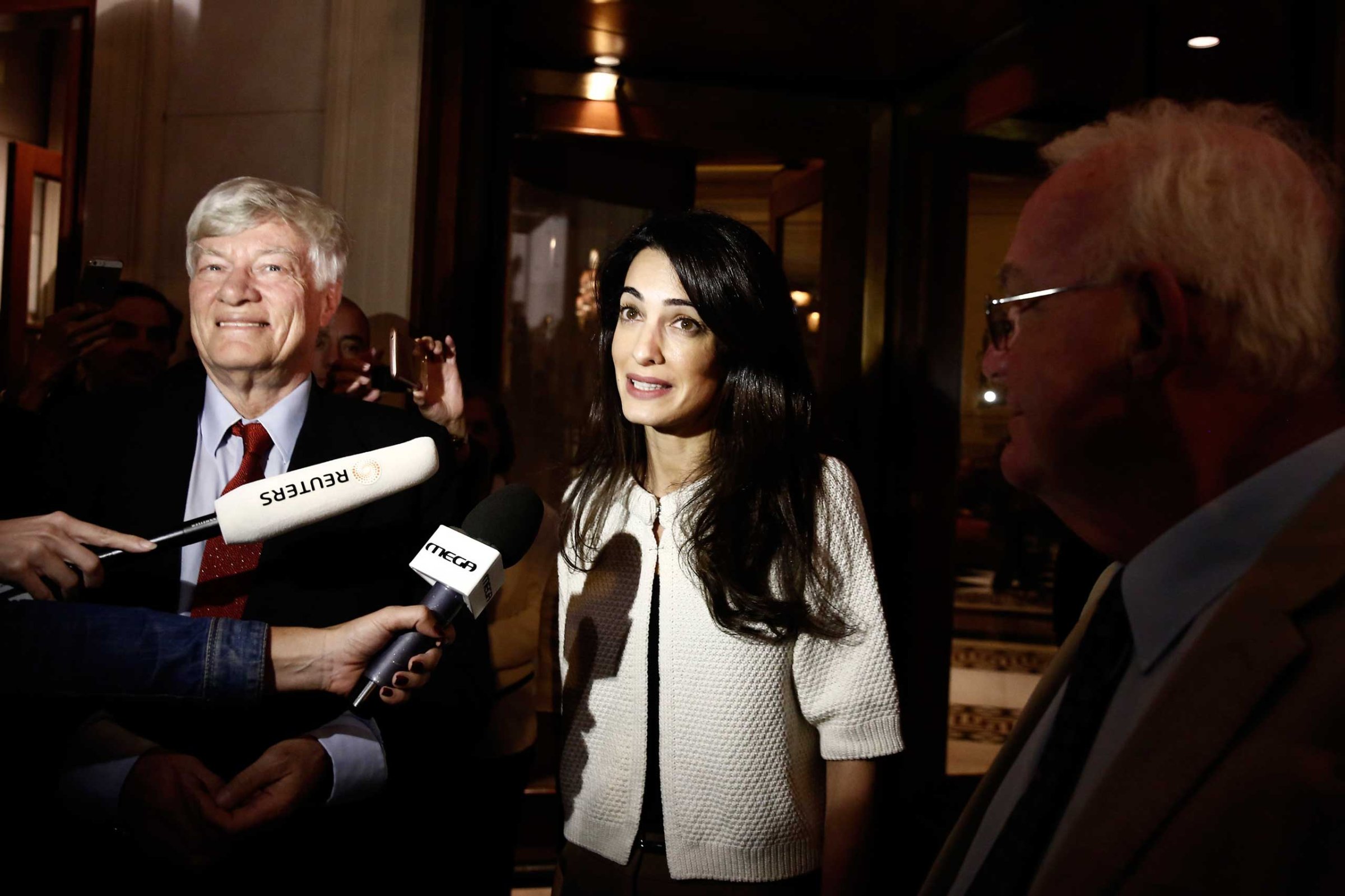
Amal Clooney, lawyer, is reported to be at the epicenter of “the west’s longest-running cultural row.” The Guardian, which coined the phrase, meant the two-century-long tussle between Athens and London over the rightful home of marble sculptures removed from the Parthenon between 1801 and 1805 by the English aristocrat Lord Elgin and later sold by him to the British Museum, where they still reside. Clooney, née Alamuddin, arrived in Greece on Oct. 13 at the invitation of the Greek Culture Minister to assist with the campaign for the marbles’ return.
But the frenzy of flashbulbs and fashion commentary that greeted Clooney’s visit shows that she has become entangled in a cultural row of greater longevity and importance than the disposition of some antique artworks, however significant those may be. Throughout her adult life, this 36-year-old attorney specializing in international jurisprudence, extradition and criminal law has stood on her own merits — accomplished, independent, respected. Now her identity risks being spirited away as the sculptures she seeks to repatriate once were. Even in the 21st century and among first-world elites, marriage retains the power to transform women into appendages, while celebrity culture reliably reduces females to ciphers. Since Alamuddin’s engagement and Venice wedding to actor George Clooney, she has never been more closely observed by a wider audience — or in greater danger of disappearing.
You might say this is Amal Clooney’s business. It is she who chose to say “I do” not only to “Hollywood’s most eligible bachelor” but also to celebrity-encrusted nuptials that created “intimate, exclusive” images for the happy couple, friends, family and the many millions of readers of publications such as People and Hello! to enjoy, showcasing the bride’s ability not only to anatomize the unfair trial of al-Jazeera journalists in Egypt under the military-backed government but also to wear nice dresses and skyscraper heels. It is Clooney who chose to retire the maiden name of Alamuddin under which she had scored many career successes and a client roster including Julian Assange and Yulia Tymoshenko. It was not, however, Clooney who chose to memorialize her first professional foray as the new Mrs. Clooney with banal reportage like this (“Move over, Kate Middleton! There’s a new hair queen in town!”). Clooney has always seemed to wear her startling beauty as lightly as her startling accomplishments, and there is nothing to suggest that she has changed.
The problem — and the reason the media repurposing of Clooney from queen of jurisprudence to hair-queen matters — is that there is still a dearth of women who rise to prominence through their own merits, reflecting the harsh reality of a world resolutely skewed against female achievement.
Many interlocking mechanisms keep women down, but in watching the transmogrification — and trivialization — of Clooney we are witnessing one of the most pernicious of these. I laughed back in June, when Britain’s Daily Mail turned its report about a global summit on combatting sexual violence into a slavering commentary on Clooney’s appearance. I laughed at reporting of the Alamuddin-Clooney marriage so tremulously overexcited by the groom (two-time “sexiest man alive”!) that it characterized the bride’s crowning attainment as “snaring” him. I laughed louder at the spoof headlines this spectacle inspired: “Internationally Acclaimed Attorney Marries an Actor,” etc.
I also laughed at that actor’s ham-fisted attempt earlier this year to boost the long-running initiative to reclaim the Parthenon marbles for Greece. “Even in England, the polling is in favor of returning the Pantheon [sic] marbles, the marbles from the Pantheon,” George Clooney said during a promotional tour for his movie about the restitution of art looted by the Nazis, The Monuments Men.
There’s nothing wrong and a lot right with stars using their celebrity power to publicize worthy causes (though it’s generally better to do the research first). However the overlapping interest of Mr. and Mrs. Clooney in this case feels uncomfortable. The Greek government originally approached the then Amal Alamuddin in 2 B.C. — that’s 2011, two years Before Clooney entered her life. Greece sought her services and those of her storied colleagues at the London-based law firm Doughty Chambers for one reason only: their collective legal expertise. Now Mrs. Clooney’s involvement in the case has been ascribed a new and more tenuous value. “We will of course be discussing all our legal options but what we really want is to keep the issue alive,” a “well-placed policy maker” told the Guardian. “There would be no better way of doing that than getting Hollywood involved and, hopefully, [George] Clooney too.”
A brilliant lawyer and strong female role model is being misappropriated, to be put on show as the latest exhibit in the Museum of Disempowered Women. Never mind restoring the marbles to Greece: give us back Amal!
More Must-Reads from TIME
- Donald Trump Is TIME's 2024 Person of the Year
- Why We Chose Trump as Person of the Year
- Is Intermittent Fasting Good or Bad for You?
- The 100 Must-Read Books of 2024
- The 20 Best Christmas TV Episodes
- Column: If Optimism Feels Ridiculous Now, Try Hope
- The Future of Climate Action Is Trade Policy
- Merle Bombardieri Is Helping People Make the Baby Decision
Contact us at letters@time.com